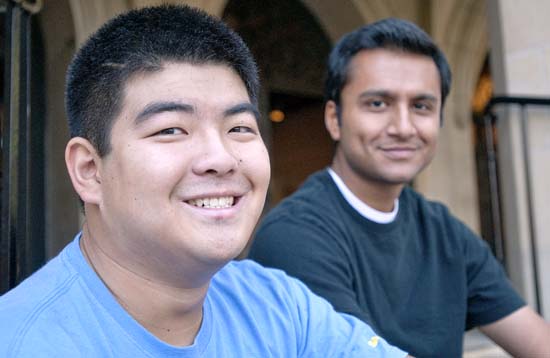Last week, Thomas DeGravel and Omar Qureshi looked down from Sproul Hall to see Covel Commons surrounded by student protesters, some throwing bottles and rocks at the police.
“The police weren’t even voting on the budget and later, when the (UC Board of Regents) tried to leave the next day, people were trying to rush them as well. My concern was that people’s approach to dealing with the fee hikes should be about the regents, the state legislature and the governor not advocating for students,” said Qureshi, a fifth-year economics student, regarding the confrontation that ensued after the regents’ decision to raise undergraduate student fees by 32 percent.
With that in mind, he and DeGravel, a fifth-year English and education student, created a Facebook event to encourage students to write to their state congressional leaders to ask them to advocate on students’ behalf by reinvesting in higher education.
The event, “Angry about the UC Fee Increase? Write to Your Congressional Leaders,” currently has close to 9,000 members garnered from University of California campuses across the state.
DeGravel stressed that the event was not created to dissuade students from protesting but to suggest other channels for advocacy.
“We just wanted to show that there were different means for having your voice heard,” he said. “We thought we could provide an alternative.”
Although the fee increases will affect students across the UC system, the repercussions will differ from person-to-person.
Writing letters accommodates a wide breadth of opinion, DeGravel said.
“I think that having a mass protest, you have that collective consciousness, but you don’t really have the individual voice. (Writing letters) gives people the opportunity to both acknowledge the personal effects of the fee hikes,” he said.
Qureshi agreed and emphasized that students should be moving past three- or four-word slogans and toward addressing those in the state legislature who decide on the budget.
“Through letters, students can articulate their message and offer some potential solutions in a short couple of paragraphs. It’s a way to make elected officials know that they care,” he said.
Similarly, the UC Office of the President has created a Web site, UCforCalifornia.org, to encourage students and others who are uncertain about the future of the UCs to advocate on behalf of the institution, said UC spokesman Peter King.
The Web site features a sample e-mail addressed to Gov. Arnold Schwarzenegger, applauding his past advocacy of the UC system but urging support for the UC’s 2010-2011 budget requests.
The goal is to reach a million advocates, King said.
“If we can get involvement from alumni, faculty, staff and educated Californians who may not have a direct link to the UC but see the UC as the economic engine that it is, we could make a difference,” King said.
Although many have RSVP’d to the Facebook event, Qureshi said his expectations remain hopeful but realistic. The target is to have 1,000 letters sent, he said.
To ensure that as many of those “Attending” clicks as possible translate into letters, DeGravel and Qureshi are considering holding a workshop on campus to help students draft their letters.
“We didn’t have any expectations for how big this event was going to get, but we figure a small percent will write in. It might be effective to have an organized event where we all can sit down and write and give each other some guidance,” DeGravel said.
DeGravel admits that part of his motivation for starting the event came from a desire to compensate for past apathy in voting on ballot measures related to the fee hikes.
“In a sense it’s hypocritical because I’m one of the people who’s pointing my finger. I didn’t do these things earlier to prevent these hikes, and now I’m kind of paying for it,” he said.
Qureshi agreed that the timing of the push on behalf of the UC could have been better but said he remained confident that students could effect change if they realized the clout they hold as a voting block.
“Essentially, elected officials care about one thing, and that’s getting reelected. If a good number of students who are registered voters show they’re concerned about an issue, state legislators are going to do what they can to get their vote,” he said.
But Qureshi said the purpose of the group was not to encourage students to send angry missives to their local representative with little constructive criticism.
“Instead, we want students to express their concerns and show that they’re aware of the issue, that they want something to happen about it and that they have real solutions,” he said.
